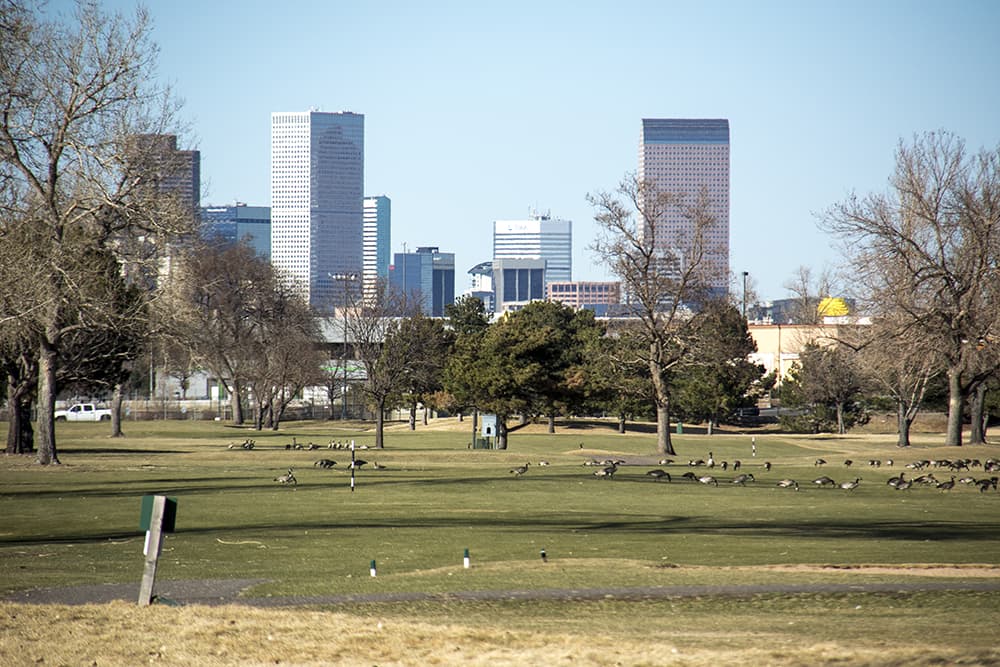Opponents of putting a major three-day music festival on Overland Golf Course fear the contract before Denver City Council is a "done deal," but at the very least, it does not seem headed for unanimous approval.
City Council members took an hour of public testimony late Monday night and asked questions of promoters from Superfly, but they didn't offer comments on the contract -- and they didn't vote. That will happen next Monday, July 31, after Councilman Jolon Clark requested the additional time.
The contract calls for Superfly to pay $200,000 rent to the Golf Enterprise Fund, along with 10 percent ticket tax and additional fees on tickets. The golf course would be closed for five weeks to accommodate setting up beforehand and cleaning up and repairing turf afterwards.
Denver Parks and Rec Executive Director Happy Haynes said the department started out as "skeptics" of the concert proposal, but after visiting Golden Gate State Park in San Francisco, site of the Outside Lands music festival, golf course managers were convinced they could host tens of thousands of people and return the turf to good condition.
The three-day festival has been pitched as a family-friendly event for the entire community. Local bands and businesses will get stage time and booths at the festival, and neighborhood residents will get discounted tickets.
In response to a question from Councilman Paul Kashmann, promoters said they had not set ticket prices yet, but a three-day pass would be somewhere in the $250 to $325 range, while a day pass might be closer to $85. Kashmann suggested that most families would have a hard time taking the kids to something that pricey, and promoters said they were thinking about making admission free for kids 10 and younger.
Other skeptical questions came from council members Rafael Espinoza, Kevin Flynn and Debbie Ortega: Is Superfly paying enough to offset the city's costs? Does this contract conform with city codes about the use of park land and the payment of deposits to fully cover expenses? What happens if Denver doesn't want the festival to continue the full five years in the contract?
Denver can cancel for breach of contract, but it would have to document what Superfly did wrong and give them a chance to fix it. Ortega wanted to know exactly what that meant. If the first year is a fiasco, does Denver have to let Superfly go another year so they can fix the problem?
More than two dozen people spoke for and against the music festival. That neighborhood testimony was divided and passionate on both sides.
Opponents argued that the golf course should be used for golf, that public park land shouldn't be turned over to a private business entity, that animals that rely on the South Platte River corridor might experience long-lasting effects from the disturbances and that neighbors' quality of life will be deeply affected by the festival.
Kathy Hamilton said the city keeps putting forward projects that exceed the "carrying capacity" of its neighborhoods, and ordinary residents don't want them.
"Remember when Colorado turned down the Olympics?" she said. "Our state didn’t want the crowd nor the expense."
Phil Hainline described himself as a resident of the neighborhood and a former sound engineer.
"I love music, I love parks, and it’s sad to see one sacrificed for the other," he said. "... With your vote, you’ll be reducing the public in public space, and you'll never be able to watch 'It’s a Wonderful Life' quite the same way again."
Kathy Dugan put it simply: "Would you want this in your neighborhood?"
But other people argued just as passionately in favor of the festival.
Terry Pasqua said she lives close enough to the golf course to have a large collection of stray balls, but she doesn't golf and doesn't get to use the land most of the year. As a golf course that collects fees, it's already restricted during the day. The music festival would give her a way to make use of this amenity.
"I’m a lover of live music and dancing, and I love my neighborhood," Pasqua said.
Mara Owen, president of the Overland Park Neighborhood Association but speaking for herself, said the revenue from the festival would help keep the golf course viable with a needed cash infusion.
"Spaces like this are precious and need to be maintained and used," she said.
And Max Hirsch, a student and musician, said the festival would give local bands an invaluable opportunity to share the stage with national acts and get exposure before a national audience.
"Denver is an island for music," he said. "It’s very hard to break out as a local musician. You’re not surrounded by a lot of other markets, and we’re not a national market, not yet. This festival could flip that."












